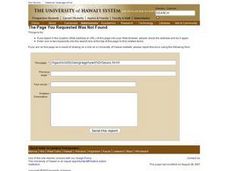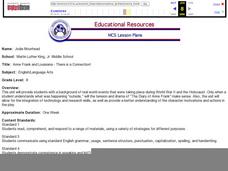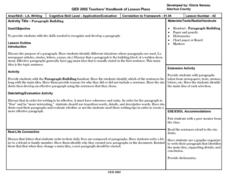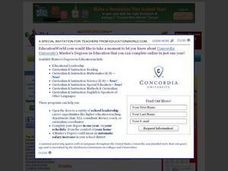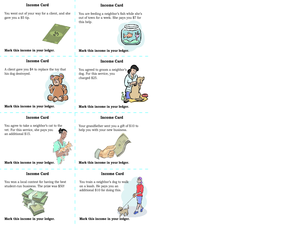Curated OER
Furniture Defined
Students dissect and evaluate traditional definitions of furniture styles. For this furniture characteristics lesson, student learn to classify different styles and types of furniture. Students create furniture sketches.
Curated OER
Etymology
Learners dissect and build words from parts like prefixes, base words, suffixes, and inflectional endings. Etymology skills help us find the meanings of words by identifying the different parts that constitute them. Class members use...
Curated OER
Mystery Words
In this language arts lesson, 8th graders verify the meaning of a word in its context, even when its meaning is not directly stated. After a class discussion on how to use context clues, students pairs are given a worksheet of "mystery...
Curated OER
Vocabulary Development
By utilizing a graphic organizer called a bubble map, young readers work toward developing their vocabulary. After reading a story, a word that has something to do with the story is put in the middle circle. Then, other words that have...
Curated OER
Choosing Words Carefully
Use literacy tools to select precise vocabulary. High schoolers respond to discussion questions that require them to consider the denotation and connotation of words. They then read non-fiction passages and identify words in the passages...
Curated OER
Wrapping It Up
Class members develop their own glossaries for unfamiliar words in each chapter in Elizabeth George Speare’s The Sign of the Beaver. After recording the word, the page number on which the word appears, and its part of speech, they...
Curated OER
Talking About Your Name in Math Terms
Add imagination and creativity to your math lesson. Young mathematicians investigate ways to express their names in mathematical terms. For instance, they can count the number of letters, analyze the geometric shapes of the letters, or...
Curated OER
What's On Your Plate?
If you are teaching in a Christian school, Sunday School, or home school environment, then this lesson would be appropriate. The class discusses Biblical traditions and culture and how that related to current Christian beliefs. They fill...
Curated OER
Geography With Dr. Seuss
Students read the book, The King's Stilts by Dr. Seuss and discuss the geographical information given in the book. Then they discuss and locate on a map the physical features that make up the continent of Africa. They create an original...
Curated OER
Investigate Career Resources
Tenth graders explore career clusters and select a job to examine. Individually, they research the educational requirements, salary, and job outlook for each resource. They complete a worksheet on careers and indicate the resource used.
Curated OER
Dinosaurs
Second graders use the internet to find information about dinosaurs. Using the information, they complete a database with where the dinosaurs lived, diet, and where bones were found. To end the lesson, they are given criteria and review...
Curated OER
Geographically Speaking
Young scholars play a matching game to reinforce the retention of vocabulary words. In this geography lesson, students watch a PowerPoint to define vocabulary words associated with geography, play a memory game with the words, and...
Curated OER
Budgeting: You Can't Manage What You Don't Know
Young scholars discuss budgets. In this mathematics activity, students watch an episode of Biz Kid$ about budgeting, participate in a guided group discussion, and create a pamphlet to teach others how to budget their money. Extension...
Curated OER
Anne Frank and Louisiana - There is a Connection!
How is Louisiana connected to the Holocaust? After reading The Diary of Anne Frank, eighth graders complete a research report about a survivor of the Holocaust who currently resides in Louisiana. Though the idea is a good way to...
Curated OER
Understanding Waves
Students examine the physical properties of waves to explore the word crest and trough. They use toys to study waves in air, water and light.
Curated OER
Paragraph Building
Build the skills your budding authors need to develop to compose well-structured paragraphs. Give them the topic sheet (included here), and have them write a cohesive paragraph using the ideas listed. Consider having them include two...
Curated OER
Definition Expedition
Students study about three ways to define a term in technical writing, search the Web for scientific text, then copy and paste sections into a Word document. Finally, they use the highlighter feature of Word to highlight examples of...
Curated OER
Proverbs of One World
Bring your class to the computer lab, and have them use the library and online resources to select proverbs related to specified themes. They create a book or bulletin board of proverbs that offer lessons connected to themes of freedom,...
Curated OER
Ch-Ch-Ching Cafe: Play Restaurant Make Change
Fourth graders make change by participating in a role-play restaurant activity. In this making change lesson, 4th graders use their math skills to compare prices and compute bills in a role play restaurant activity.
Curated OER
Olympic Shadow Boxes
What a cool way to incorporate art and use reference materials. Learners use classroom reference materials such as almanacs, encyclopedias, and dictionaries to answer one of four questions, and then they use the information to create a...
Curated OER
Whole Language Approach to Map Making
Fifth graders, after reading Island of the Blue Dolphins, explore map making using the Whole Language Approach.
Curated OER
Time Capsule: Oral Presentation
A great way to gain proficiency when learning a new language is to prepare an oral presentation. In this foreign language lesson, pairs collaborate to develop a Time Capsule which they present to their class using their target...
Curated OER
Income and Expenses
Young scholars discuss income and expenses. In this lesson on money, students define income and expenses, after whith they keep track of their income and expense transactions on a basic ledger.
Curated OER
Planning A Vacation Online
If you could travel anywhere in the United States, where would you go? Use this question to interest your fourth, fifth, and sixth graders as they experiment with Mapquest or other direction-based resources. They choose where they'd like...










